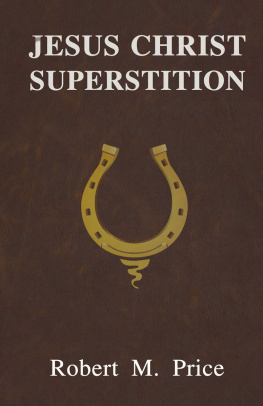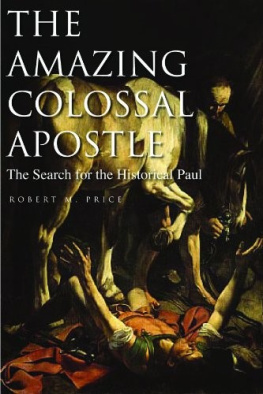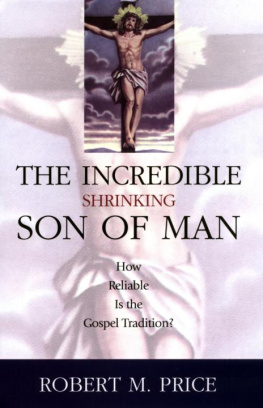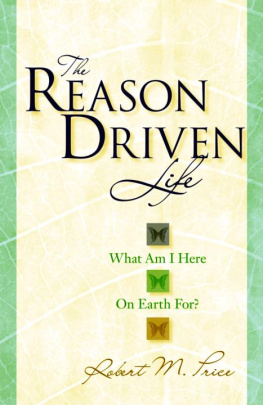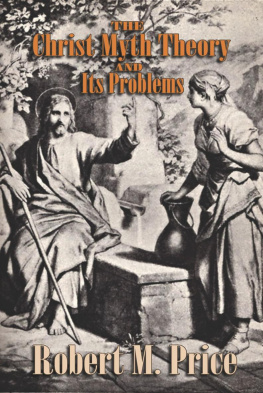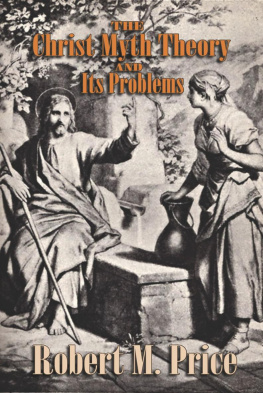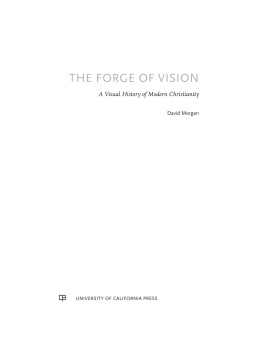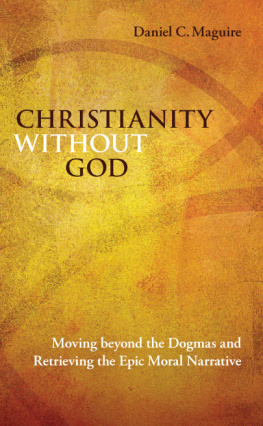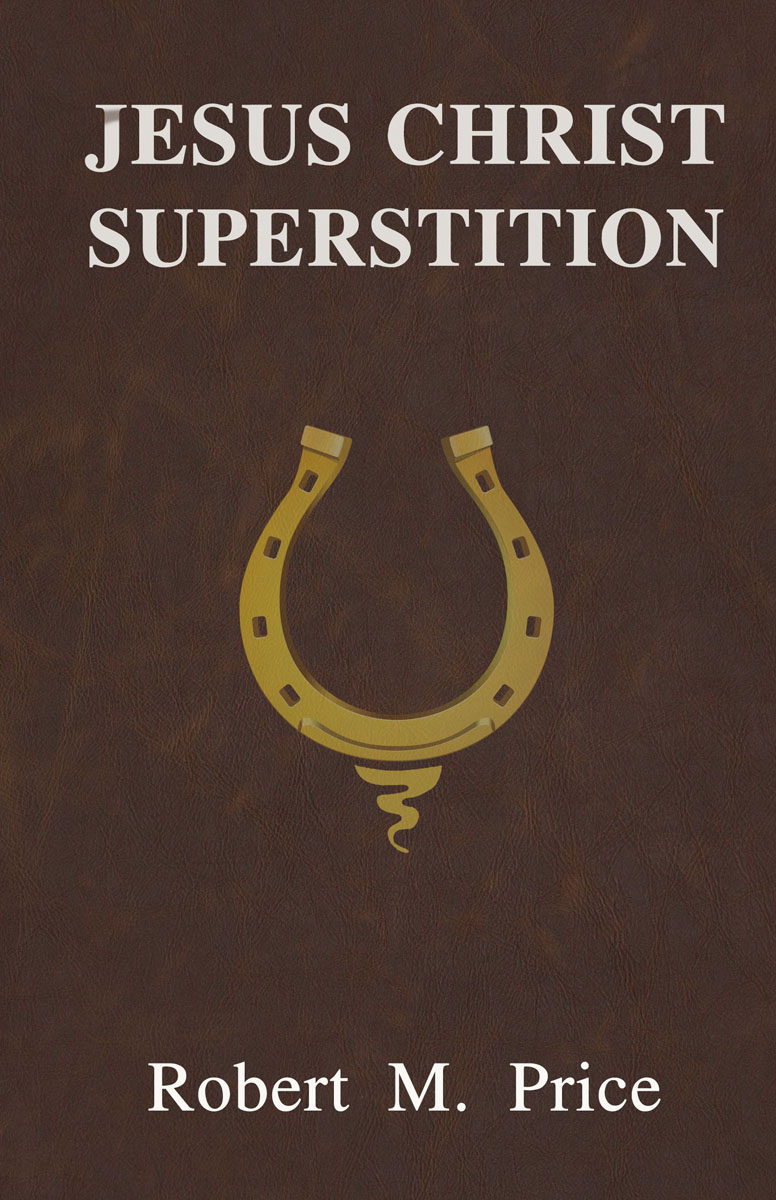

Pitchstone Publishing
Durham, North Carolina
www.pitchstonepublishing.com
Copyright 2019 Robert M. Price
All rights reserved.
Printed in the USA
10 9 8 7 6 5 4 3 2 1
Library of Congress Cataloging-in-Publication Data
Names: Price, Robert M., 1954- author.
Title: Jesus Christ superstition / Robert M. Price.
Description: Durham, North Carolina : Pitchstone Publishing, 2019. | Includes bibliographical references.
Identifiers: LCCN 2019016900 (print) | ISBN 9781634311908 (pbk. : alk. paper)
Subjects: LCSH: Jesus Christ--Person and offices--Miscellanea. | Common fallacies--Miscellanea. | Superstition.
Classification: LCC BT203 .P745 2019 (print) | LCC BT203 (ebook) |
DDC
232--dc23
LC record available at https://lccn.loc.gov/2019016900
LC ebook record available at https://lccn.loc.gov/2019980952
For John Loftus, a living refutation of the gospel proverb, The disciple is not greater than his master.
Contents

Introduction

Just what is superstition? It is related to phobias, which are unreasonable fears, fears that are not justified by any impending threat or danger. A superstition, too, usually involves groundless fears. The superstitious person has certain beliefs, inherited from popular culture and family tradition, that certain actions will produce destructive results without any real-world causal connection. Why should walking under an open ladder curse one with bad luck? Obviously, carelessly stepping under the ladder might topple a can of paint resting on the top. But that is not what the superstitious person fears. He or she dreads some ill fortune not directly brought about by any natural connection. Why would a black cat crossing ones path make one a lightning rod for misfortune? Or opening an umbrella inside your house? Or breaking a mirror? Spilling salt? And so on. Conversely, why should rubbing a rabbits foot, clutching a four leaf clover, throwing a pinch of salt over ones shoulder, avert such disaster?
If someone believes these things, what is the nature of such beliefs? They must be distinguished from other pre- or non-scientific beliefs such as demon possession, where ones illness or mania is supposed to be the result of invasion by an evil disembodied entity. In an extended sense, the belief in possession might be considered superstition, though, unlike the black cat business, there would at least be a supposed causal connection, as in L. Ron Hubbards classic tale Fear wherein a couple of loitering devils overhear a man scoffing at belief in demons and decide to show him how wrong he is. I should consider belief in possession an example of ancient science, akin to alchemy and astrology, even belief that the rainbow is Jehovahs war bow hanging in the sky. All these notions are products of intellectual ingenuity, only unaided by scientific technology.
But the same cannot be said for a belief in unlucky cats and ladders. These connections are altogether arbitrary. As far as I know, no superstitious person has tried to explain how and why the deeds in question produce the bad results. If you could find out why the black cat brings bad luck, maybe you could prevent it. But why bother? Isnt it simpler just to jump out of the cats way? Just to steer clear of ladders?
The title of the present book suggests a connection between superstition and religion, specifically Christianity. I think of Plutarchs statement: The atheist believes there is no God; the superstitious man believes there is a God but wishes there werent. Once I spoke with a woman who was hag-ridden by the belief that God hated her and was sending all sorts of misfortune her way, to punish her for not worshipping him. Plutarch might as well have been talking about this woman, Janine. I have never met anyone like her. She was not religious, or would not have thought of herself as such, but was not hers a religious belief? There is most definitely a God, a spiteful and vindictive one, who is firing bullets with Janines name on them! She was much like Job in the Bible, unfairly plagued by Jehovah, though he knew he had done nothing to deserve such treatment. Job was pretty indignant, but he didnt go so far as to hate God.
Neither did any of the biblical writers. They blamed themselves, or rather Israel as a whole, for their troubles: military defeats, exiles, pestilences, famines, etc. The Deuteronomic theology (so called because we find it set forth in the Book of Deuteronomy) held that God had made a covenant agreement with Israel. Henceforth he should be their God and they should be his faithful people. As long as they worshipped Jehovah (Yahweh) alone, forswearing other deities and all idols, God would watch over them, protecting them from their enemies, from disease, from famine, etc. But if his people transgressed the terms of the deal, they could not expect their divine patron to hold up his end of the bargain. The way the Old Testament writers told it, the numerous catastrophes that overtook Israel/Judah were the result of Israels faithlessness. This self-abnegating conclusion was entirely deductive. The Bible writers thought the same way Jobs blame-laying companions did: if misfortune strikes you down, you must have deserved it. The Deuteronomic historians (authors of Joshua, Judges, Samuel, and Kings) often fabricated sins to justify the disasters. Why? Because the alternative would be even worse: admitting that there was no covenant, and no God, at least no justice. This would mean man is alone in an indifferent universe with no protection and no reason to hope that the right, and the righteous, will prevail.
I would have to call this belief superstitious for the simple reason that the supposed cause behind misfortunes is an after-the-fact rationalization based on ad hoc unseen factors rather than observation. Causation that is posited to rescue religious belief seems to me little different from positing inexplicable connections between a sauntering feline and bad luck. And, just so as not to discriminate, I would say the same thing about the Hindu-Buddhist-Jainist belief in Karma, where a good reason for any tragedy or affliction may be dreamed up in order to protect the belief in cosmic justice. Master, who sinned, this man or his parents, that he was born blind? (John 9:2).
Another major feature of orthodox, traditional Christianity as superstition concerns biblical literalism, the stubborn insistence that all the narrated miracles really happened in the same history we live in, that the world was created inside of a week, that dinosaurs and humans lived side by side, that there is a personal devil, etc. These beliefs were not always superstitions. No one knew any better in biblical times. But since the advent of science and historical methodology, believing these things is a very different proposition. As Paul Tillich Scientific Creationists, etc., are consciously lying. They should know better, but they dont. They wont let themselves know better. Their literalism, as a mental operation, is the same as believing in superstitions.
Those who live in an unbroken mythological world feel safe and certain. They resist, often fanatically, any attempt to introduce an element of uncertainty by breaking the myth, namely, by making conscious its symbolic character. Such resistance is supported by authoritarian systems, religious or political, in order to give security to the people under their control and unchallenged power to those who exercise the control.
Next page
